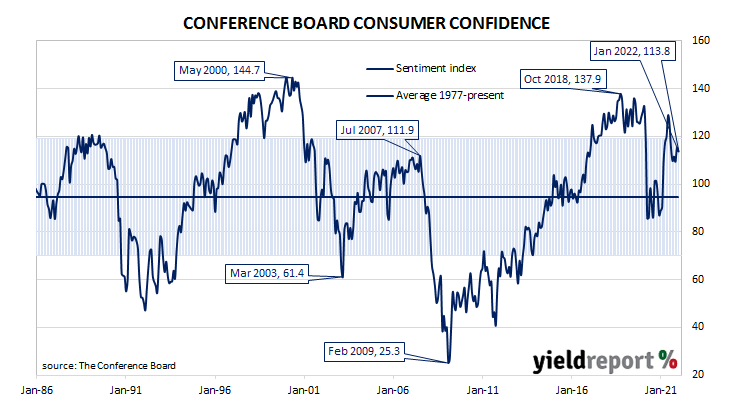Summary: Conference Board Consumer Confidence Index declines in January; reading slightly above expected figure; views of present conditions improve, short-term outlook less rosy; US economy on “solid footing” but moderating growth likely in first quarter; inflation concerns decline for second month but remain “elevated”.
After the GFC in 2008/09, US consumer confidence clawed its way back to neutral over a number of years and then went from strength to strength until late 2018. Measures of consumer confidence then oscillated within a fairly narrow band at historically high levels until they plunged in early 2020. Subsequent readings from the survey then fluctuated around the long-term average until March 2021 when they reached elevated levels.
The latest Conference Board survey held during the first three weeks of January indicated US consumer confidence has deteriorated marginally after a modest improvement in December. January’s Consumer Confidence Index registered 113.8 on a preliminary basis, a reading which was slightly above the median consensus figure of 111.9 but less than December’s final figure of 115.2.
Consumers’ views of present conditions improved while their outlook for the near-future deteriorated. The Present Situation Index increased from a revised figure of 144.8 to 148.2 while the Expectations Index declined from a revised figure of 95.4 to 90.8.
“The Present Situation Index improved, suggesting the economy entered the new year on solid footing. However, expectations about short-term growth prospects weakened, pointing to a likely moderation in growth during the first quarter of 2022,” said Lynn Franco, a senior director at The Conference Board.
US Treasury bond yields jumped at the short end but rose much modestly elsewhere along the curve on the day. By the close of business, the 2-year Treasury bond yield had gained 6bps to 1.03% while 10-year and 30-year yields both finished 1bp higher at 1.78% and 2.13% respectively.
In terms of US Fed policy, expectations for the federal funds range over the next 12 months moved a little more in favour of more rate rises. April contracts implied an effective federal funds rate of 0.345%, 26bps higher than the current spot rate while June contracts implied 0.57%. February 2023 futures contracts implied an effective federal funds rate of 1.125%, 105bps above the spot rate.
Franco noted respondents’ inflation concerns declined for a second month “but remain elevated after hitting a 13-year high in November 2021.” He expects households will “continue to be challenged by rising prices and the ongoing pandemic.”
The Consumer Confidence Survey is one of two monthly US consumer sentiment surveys which result in the construction of an index. The Conference Board’s index is based on perceptions of current business and employment conditions, as well as respondents’ expectations of conditions six months in the future. The other survey, conducted by the University of Michigan, is similar and it is used to produce an Index of Consumer Sentiment. That survey differs in that it also includes some longer-term questions.


